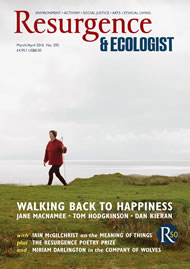For those of you familiar with the writings of Wendell Berry, here is another opportunity to listen to what this wise poet, philosopher and farmer has to say. For those who come to him for the first time, you are in for a treat. Berry is a wonderful read, carrying you along somewhat gently and then speaking the truth with such clarity and simplicity that it jolts you into attention. For the truth is that we have a problem.
As the possibility of a mighty climatic catastrophe looms, with ever more evidence to suggest that we are too stupid or too greedy to change our ways in time, we are faced with the question of what we should do; and thus we are faced with the question of how we shall be. For the dilemma we face has not arisen by accident, but as a consequence of who we have become. As the Buddha tells us in the opening stanza of the Dhammapada, “With our thoughts we make the world.”
This being so, we must most urgently confront and question the values and principles that presently govern our ways of being, both privately and publicly.
What is required, and what is required now, is nothing less than a transformation of Being, the letting go of ways of being that are profoundly damaging and the finding of other ways that are not. We needs must learn how to dwell.
Many readers of Resurgence & Ecologist will have already worked this out for themselves, but in his new collection of essays Berry urges us to set this consideration in that which is close by. Acknowledging the growing concern about climate change, he most especially asks us to care for something that receives much less attention: the abuse of the land and the people who look after it. After all, how can we care for the Earth unless we care for the pasture and the hedgerow? The need to be present is underlined. Otherwise, he says, the present “is going by and we are not in it”. Instead of trying to save the world, we must “start to live savingly in it”. To prepare rightly for tomorrow, we must “do the right things today”.
Berry has often warned us of the damaging effects of industrialised farming: damaging to the hillsides that it ploughs up, by removing the sod that once covered and preserved the soil year round, in the pursuit of quick but ultimately unsustainable profits; and damaging to the life of the small farmer thrust aside by its violent disregard. But now he particularly draws our attention to two matters:
First, there is the need always to see economy and society as a whole:
“[We] must not speak … of the land alone or of the people alone, but always and only of both together. If we want to save the land, we must save the people who belong to the land. If we want to save the people, we must save the land the people belong to.”
And secondly, we must do this in ways that are guided by principles of care and love, for it is impossible to suppose that “humans would ever take good care of anything they don’t love”. You cannot really know anything you don’t love, and to know it well requires careful attention, literally attention that is full of care: “People who don’t care, or know enough to care enough, or care enough to know, don’t watch.”
This implies certain principles of pace and scale, a pace that is slower and a scale that is more human. In this, Berry refers to some of the principles adopted by the Amish communities, principles that affect the size of their farms according to their landscape and the need for care.
A variety of matters are discussed in these essays: not only farming, but also abortion, gay marriage and the violence of the industrial economy; and there is some good detail about forms of cultivation, forestry, and what it is that makes community. But the matter that caught my attention was this: the need for kindness and care, and the need to begin our work close by, to care for each other and our land.






